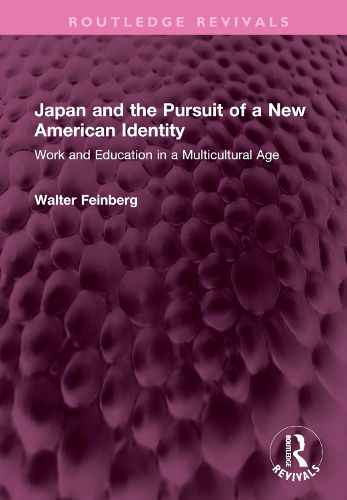Readings Newsletter
Become a Readings Member to make your shopping experience even easier.
Sign in or sign up for free!
You’re not far away from qualifying for FREE standard shipping within Australia
You’ve qualified for FREE standard shipping within Australia
The cart is loading…






First published in 1993, Japan and the Pursuit of a New American Identity is a sophisticated analysis of the mission of education in a multicultural age. Arguing that American education has been too long constrained by conservative discourse - which positions schools and students as weapons in an international competition with the Japanese - author Walter Feinberg assesses the cultural and philosophical limits of conservative vision as popularized by exponents Allan Bloom and E. D. Hirsch. Feinberg then develops a vision of education which accommodates the growing cultural diversity of American society and American schools. At the heart of Feinberg's study is a unique philosophical analysis of Japanese and American attitudes towards work and education. Through a series of sensitively developed interview with American and Japanese workers, managers, parents, and teachers who have experienced life in one another's culture, he examines the implications of our profound cultural differences with the Japanese for the development of a new American, multicultural identity. This book will be of interest to students of education, pedagogy, history and public policy.
$9.00 standard shipping within Australia
FREE standard shipping within Australia for orders over $100.00
Express & International shipping calculated at checkout
First published in 1993, Japan and the Pursuit of a New American Identity is a sophisticated analysis of the mission of education in a multicultural age. Arguing that American education has been too long constrained by conservative discourse - which positions schools and students as weapons in an international competition with the Japanese - author Walter Feinberg assesses the cultural and philosophical limits of conservative vision as popularized by exponents Allan Bloom and E. D. Hirsch. Feinberg then develops a vision of education which accommodates the growing cultural diversity of American society and American schools. At the heart of Feinberg's study is a unique philosophical analysis of Japanese and American attitudes towards work and education. Through a series of sensitively developed interview with American and Japanese workers, managers, parents, and teachers who have experienced life in one another's culture, he examines the implications of our profound cultural differences with the Japanese for the development of a new American, multicultural identity. This book will be of interest to students of education, pedagogy, history and public policy.